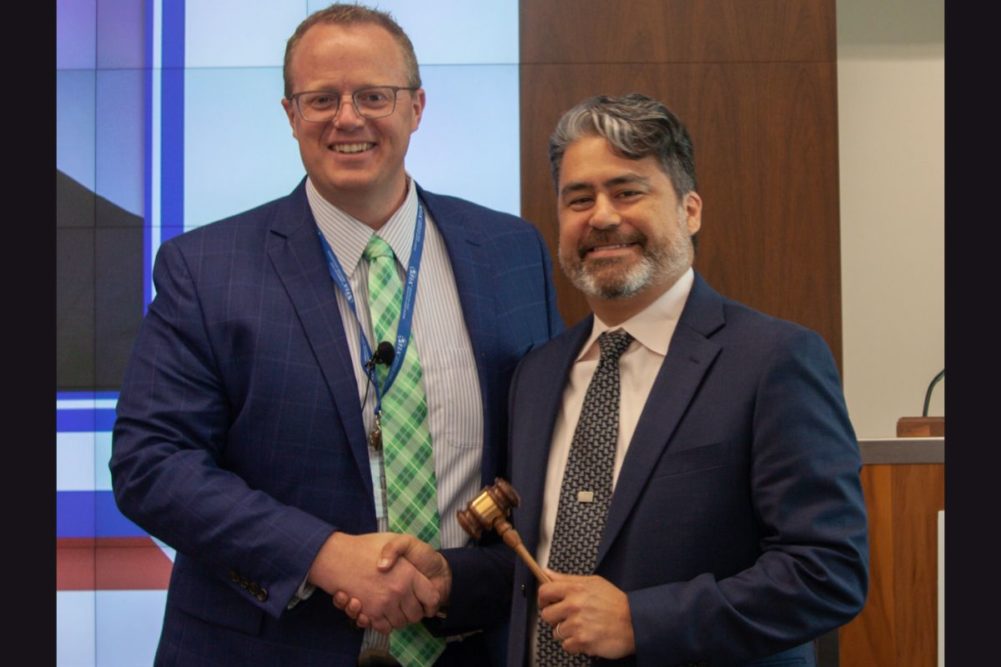ARLINGTON, VIRGINIA, US — Carlos Gonzalez, PhD, worldwide director of regulatory affairs for Hill’s Pet Nutrition, Inc., was installed as the 2023-24 chair of the American Feed Industry Association (AFIA) board of directors during its annual spring meeting, where it conducted official business, approved new leadership and directors, heard from federal officials and pursued policy priorities with lawmakers on Capitol Hill.
“I have worked with staff and members of this organization since the early 2000s when I began my regulatory career and am blown away by the work that you do,” Gonzalez said. “I am humbled that you have put your trust in me as board chair over the next year.”
Gonzalez succeeds Mike Gauss, president of Kent Nutrition Group, Inc., who transitions into one year of service as chair of the Institute for Feed Education and Research’s (IFEEDER) Board of Trustees. During its official business meeting May 18, the AFIA board also voted to accept the nomination of Leigh Ann Sayen, chief executive officer of The Petersen Co., to become chair-elect of the organization for 2024-25.
“The future for AFIA is very bright with the phenomenal staff and incoming leadership of Carlos and Leigh Ann,” Gauss said. “They both have diverse backgrounds and amazing skills that will benefit the association, industry and our members greatly.”
In addition, the board approved seven additions to the AFIA Executive Committee: Holly Bellmund, GLC Minerals, LLC; Rob Brock, Westway Feeds; Julio Contreras, Sweet Manufacturing; Dan Hennessy, Land O’Lakes; Dan Meagher, Novus International; Mark Poeschl, Furst Mcness Company; Dan Rice, Western Milling; and Wesley Wilson, Ag ProVision, LLC.
The complete 48-member list of directors can be found on AFIA’s website.
During its board briefing a day earlier, directors heard from Tracey Forfa, director for the Food and Drug Administration’s (FDA) Center for Veterinary Medicine (CVM), and Tim Schell, PhD, director of the FDA’s Office of Surveillance and Compliance, on the regulatory process for approving new animal food ingredients, especially those with non-nutritive benefits (reduced food safety pathogens or emissions, for example), agency resources and more.
“We have pushed very hard to recognize that there are a lot of novel feed ingredients coming down – that is the future,” Forfa said. “We recognize that, and so we have been really working very hard to figure out how to make the process for reviewing those keep up with the times.”
Forfa said regulating products in 2023 with legal authorities based in the 1930s is a challenge that CVM’s lawyers have been ironing out. In addition, the CVM has been bringing technical experts on board to help the agency keep pace or stay slightly ahead of innovations in the regulated industries.
The board also heard from Daniel Whitley, administrator of the US Department of Agriculture’s Foreign Agricultural Service, on two public-private partnership programs that promote agricultural products abroad: the Market Access Program (MAP) and Foreign Market Development (FMD) Program.
“The programs have not had an infusion of increased funding – ever,” Whitley said. “They are still at the same (levels) they were at decades ago. The problem is our competitors see how well we’re doing with promoting our products, so now they are starting to do it. But they are starting to invest and spend more money than what we have.”
The board followed up its briefing on May 18 when directors visited US Senate and House offices, where they lobbied for a legislative amendment to regulating novel animal food additives at the FDA as feed ingredients, instead of drugs; $5 million in increased funding for the CVM; and key farm bill trade and conservation programs that can help the industry remain globally competitive and sustainable in the future.





